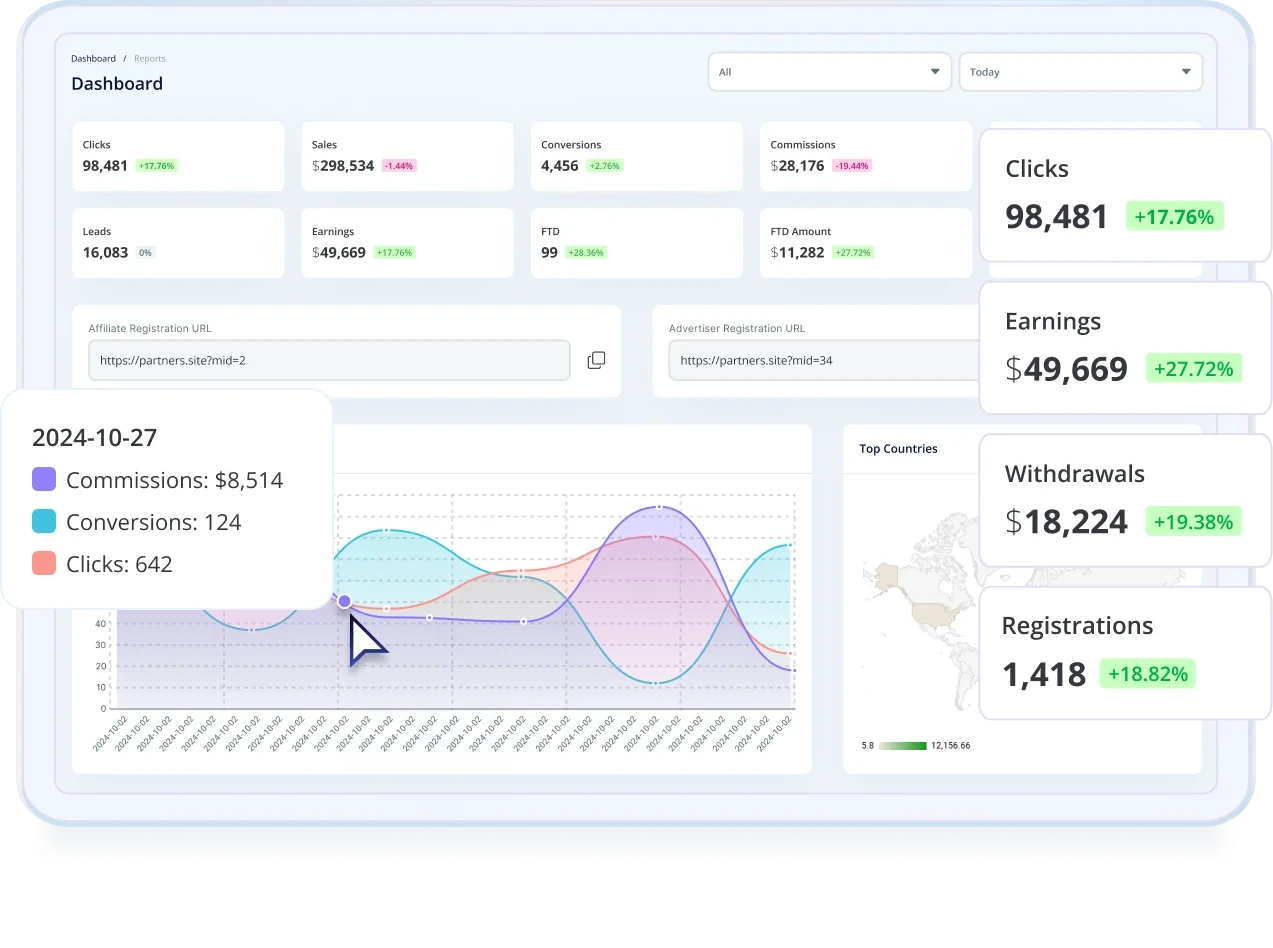Understanding Affiliate Marketing Software Development
Affiliate marketing has revolutionized the way businesses attract and retain customers, enabling companies to expand their reach while incentivizing external partners. Behind every successful affiliate program lies robust software that streamlines operations, tracks performance, and ensures transparency. Developing affiliate marketing software requires a combination of strategic planning, technical expertise, and a deep understanding of the needs of businesses and affiliates alike.

Why Off-the-Shelf Affiliate Software May Not Meet Your Business Needs
Off-the-shelf affiliate software solutions often fail to meet the specific needs of companies for several reasons. While these tools may offer general features suitable for a wide range of users, they lack the customization required for individual business models, industry nuances, and unique marketing strategies.
One key limitation is that most ready-made affiliate platforms are designed with a broad audience in mind, making them overly generalized. This can result in certain functions being irrelevant or difficult to adapt for companies with specialized requirements. For instance, a company that sells high-ticket items may need a more advanced commission structure than what is typically provided in standard affiliate software. Similarly, businesses operating in niche markets may find that the software doesn’t integrate with their existing systems or fail to cater to their specific promotional strategies.
Another issue is scalability. Many out-of-the-box affiliate solutions are designed for small to medium-sized businesses, but they may struggle to keep up with the growth of a larger company. As businesses expand, they often require more robust tools that can handle higher volumes of traffic, more affiliates, and complex reporting. Off-the-shelf solutions may not have the flexibility to scale effectively or adapt to the increased complexity.
Furthermore, ready-made software might not offer the level of support or ongoing updates necessary for companies to stay competitive. Businesses often need tailored solutions to address emerging trends or incorporate the latest technologies in their affiliate programs. In such cases, building a custom affiliate solution ensures that companies can integrate features that align with their long-term goals and stay ahead of the competition.
Ultimately, when a business faces specific challenges, relying on off-the-shelf software might lead to inefficiencies or missed opportunities. Tailored solutions provide flexibility, scalability, and the precise functionality required to run a successful affiliate program.
Key Features of Affiliate Marketing Software
To create impactful affiliate marketing software, developers must integrate essential features that address the needs of all stakeholders:
Affiliate Tracking: Accurate affiliate tracking mechanisms are crucial for attributing sales, clicks, or leads to specific affiliates. This typically involves cookies, unique tracking links, or advanced tracking technologies like fingerprinting.
Customizable Dashboards: Both businesses and affiliates benefit from user-friendly dashboards that display real-time metrics such as conversions, commissions, and performance trends.
Automated Payments: A streamlined payment system simplifies commission disbursement, supporting multiple payment methods and currencies to cater to a global audience.
Performance Analytics: Detailed analytics empower businesses to evaluate campaign success, identify high-performing affiliates, and optimize strategies.
Fraud Detection: Implementing fraud detection mechanisms safeguards businesses against unethical practices like cookie stuffing or fake traffic.
Integration Capabilities: Seamless integration with e-commerce platforms, CRM systems, and payment gateways ensures smooth workflows.
Scalability: The software should accommodate the growth of affiliate networks, allowing for an increasing number of users and transactions without compromising performance.
Steps in Developing Affiliate Marketing Software
Requirement Gathering: Begin by identifying the target audience and understanding their specific needs. Are you building software for small businesses, enterprises, or a specific niche?
Technology Stack Selection: Choose a suitable technology stack based on scalability, security, and functionality. Common choices include PHP, Python, and Node.js for the backend, and React or Angular for the frontend.
Designing the Architecture: Create a robust software architecture that ensures scalability, data integrity, and seamless user experience.
Feature Development: Develop core features such as tracking, reporting, and payment systems. Use modular development practices to enable future upgrades.
Testing and Quality Assurance: Rigorous testing ensures the software functions flawlessly. Test for performance under high traffic, data accuracy, and security vulnerabilities.
Launch and Feedback: Deploy the software and collect user feedback to address any shortcomings and refine the product.
Challenges in Affiliate Marketing Software Development
Data Privacy: With increasing regulations like GDPR and CCPA, ensuring data privacy is paramount.
Real-Time Processing: Handling real-time tracking and reporting requires optimized algorithms and infrastructure.
User Retention: Offering intuitive interfaces and robust support ensures affiliates stay engaged with the platform.
Future Trends in Affiliate Marketing Software
The affiliate marketing landscape is evolving, and so is the software supporting it. Trends such as AI-driven analytics, blockchain-based tracking for enhanced transparency, and mobile-first designs are shaping the future of this domain. Developers must stay ahead of these trends to create software that meets emerging demands.
Insights from Industry Experts
“The process of developing affiliate marketing software is a complex journey rooted in personal experience with numerous affiliate programs and other affiliate software. Our goal was to create a new, unique tool capable of fully addressing the needs of companies operating in iGaming, Finance, Affiliate networks, IB affiliate software, E-commerce, and other popular niches. By deeply understanding our clients’ needs, the Tracknow team confidently achieved its goal and delivered a high-quality interface to the market.”
Vladislav Soloviev, founder of Tracknow.io
Conclusion
Developing affiliate marketing software is a multifaceted process that requires a blend of technical and strategic expertise. By focusing on user-centric features, addressing challenges, and staying adaptable to future trends, businesses can create solutions that empower their affiliate networks and drive sustained growth. Whether you’re a startup or an established enterprise, investing in robust affiliate marketing software is a step toward building stronger partnerships and achieving long-term success.
